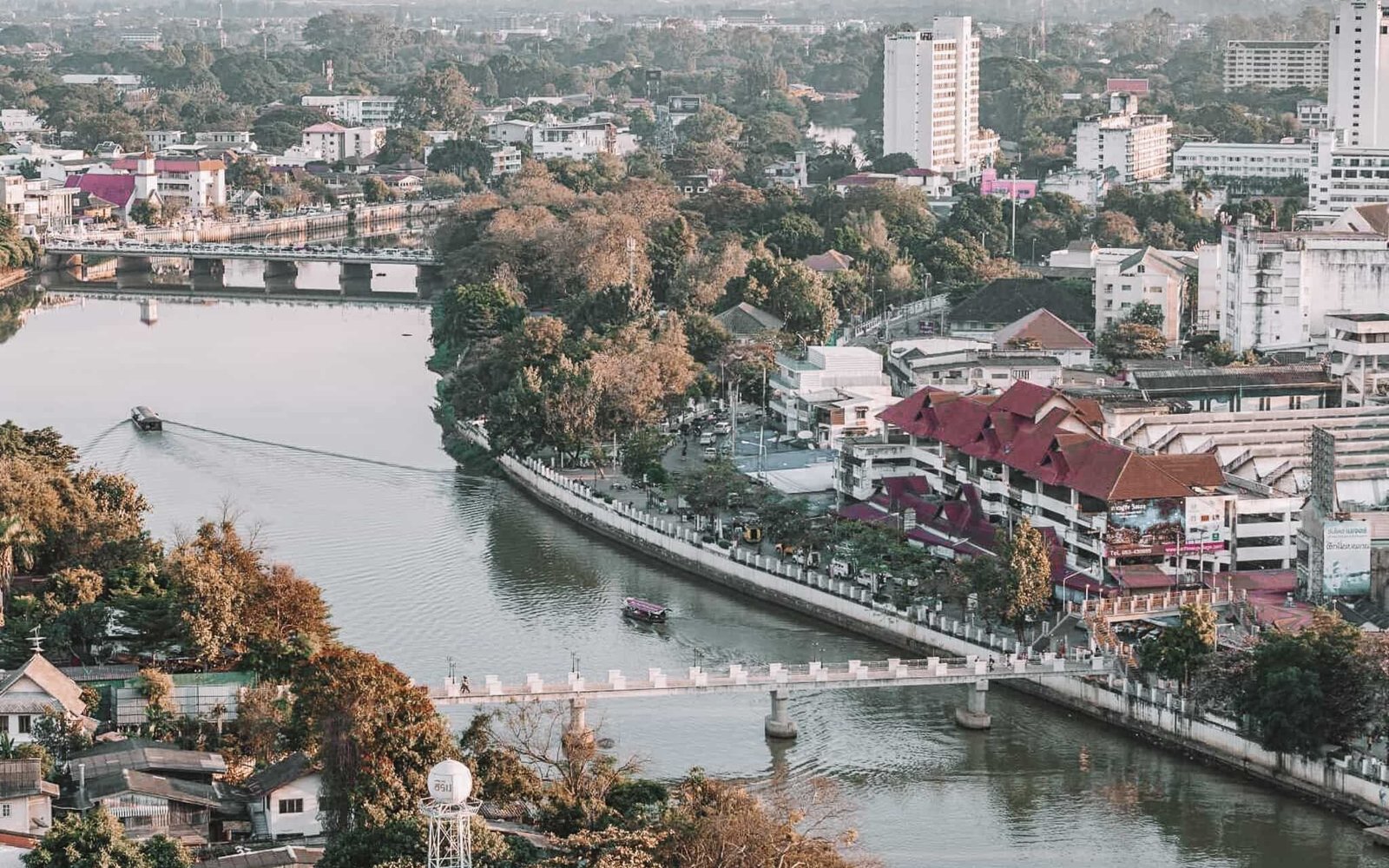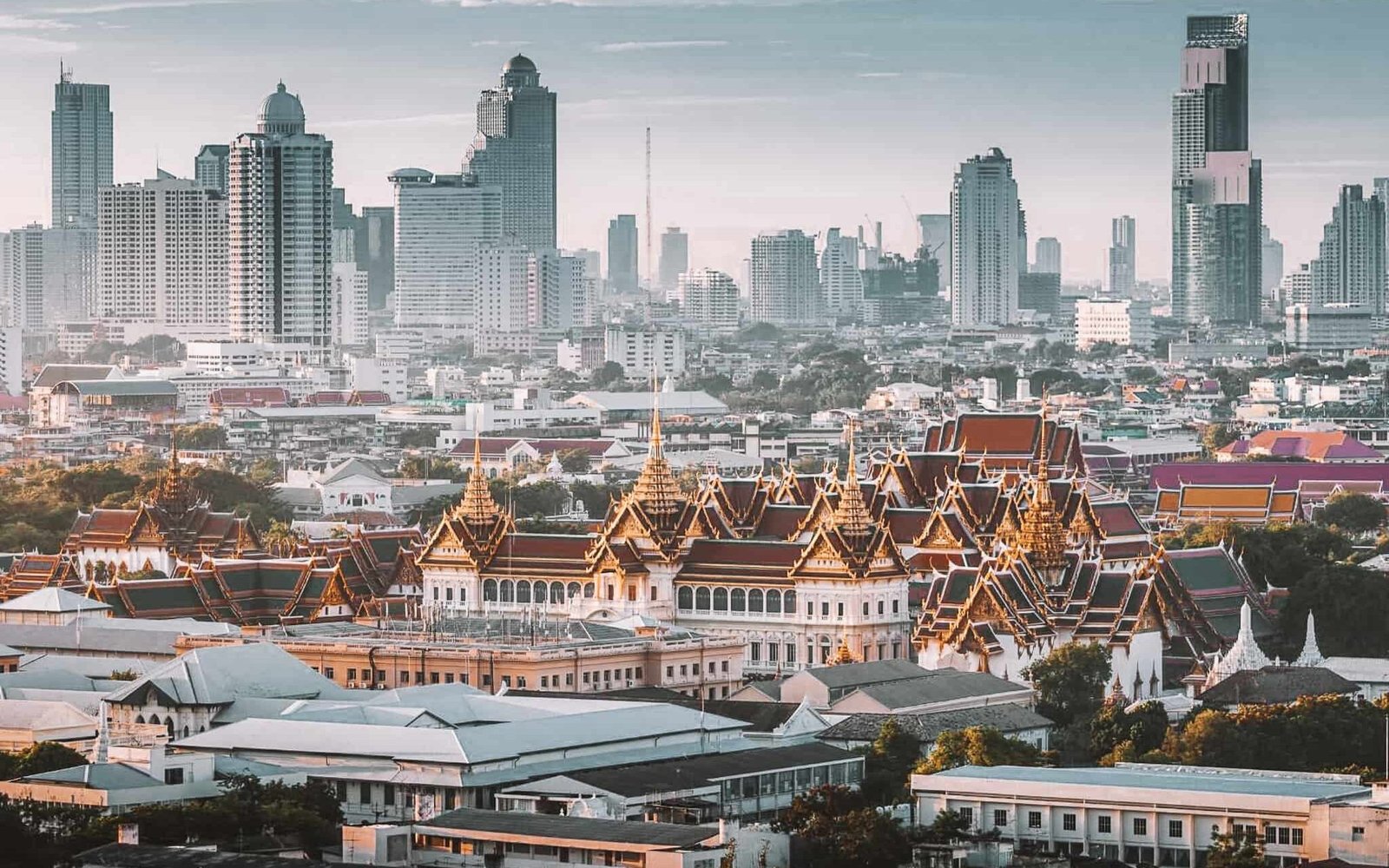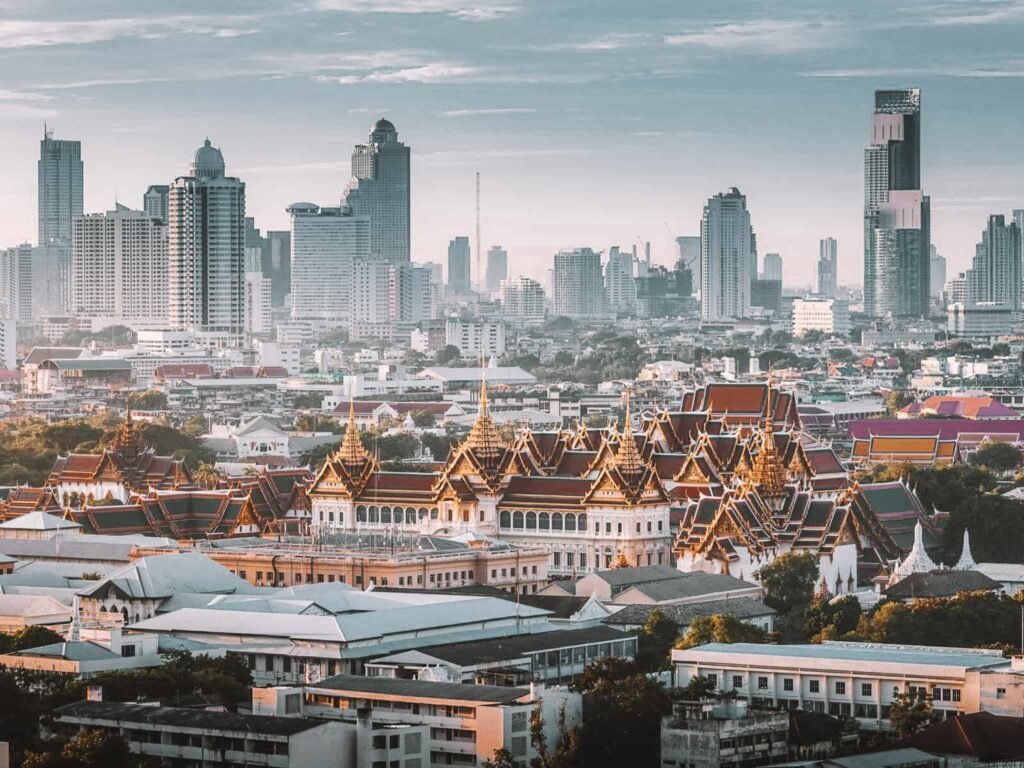Roaming around Southeast Asia and want to know how the digital nomads in Thailand stay here longer, the places to work, and what they do in their free time?
Great, because this is exactly what this guide is about.
Whether you’re drawn to the vibrant streets of Bangkok, the calmer mountains of Chiang Mai, the stunning beaches of Krabi, or the island life in Phuket, Thailand offers an unparalleled experience for remote workers.
This guide is your ticket to finding the perfect spot in Thailand where productivity meets paradise. And I’m sure you’ll find your happy place by the end of the post.
Is Thailand Worth it for Digital Nomads?
Absolutely! Thailand offers an unbeatable mix of affordable living, fast internet, and co-working spaces.
The rich culture, delicious food, and stunning landscapes make it more than just a place to work.
Cities like Bangkok and Chiang Mai have vibrant expat communities, so you’ll never feel alone. Conversely, Phuket and Krabi are great for enjoying life on the beach in your free time.
Whether you’re on a tight budget or looking to indulge a bit, Thailand caters to all.
Why Is Thailand so Popular for Digital Nomads?
There are so many reasons for digital nomads to stay longer in Thailand. These include the low cost of living, reliable internet, welcoming vibe, and booming digital nomad community.
You can enjoy world-class beaches, explore ancient temples, and savor street food, all while staying connected.
Plus, its central location in Southeast Asia makes it a great base for exploring other countries around.
Tip for first-timers: be sure to check out the best spots for first-time visitors in Thailand.
Thailand Visas for Digital Nomads
Thailand offers various visa options for digital nomads, but no exact digital nomad visa.
The tourist visa is a start, but for longer stays, consider the “Smart Visa” or the “LTR visa.” Some people even refer to this as the “new digital nomad visa.”
This requires more paperwork and has higher requirements. However, it’s worth it for the stability it offers since it allows you to stay in Thailand for 10 years.
Many digital nomads in Thailand decide to stay on a student visa for one or two years. Then they take the opportunity to learn the language and culture as well, which is a nice addition.
Best Places for Digital Nomads in Thailand
Now that you have more information and context about being a digital nomad in Thailand, let’s get into this next section, which is the best spot in the country to work.
I’ve separated this into 4 places. These are not only the best among nomads but also the best equipped in terms of places to work and WiFi speed:
- Chiang Mai
- Phuket
- Krabi
- Bangkok
Want to know more?
Make sure to read until the end to have a good idea about each city and what it has to offer!
Chiang Mai
Chiang Mai is like a cozy area in the mountains of Northern Thailand. This calls for all digital nomads looking for peace and a splash of local culture.

And if there was only one place to pick for digital nomads in Thailand, Chiang Mai would be the one for many remote workers out there.
It’s a place where you can wake up, grab your travel laptop, and head to a café surrounded by beautiful temples and nature. With its chill vibe, friendly Chiang Mai locals, and affordable living, Chiang Mai is a dream spot for pretty much anyone.
Cost of Living
Chiang Mai is a digital nomad’s dream due to its affordability. The cost of living in Chiang Mai is $800 to $1,200 a month. With this, you can cover rent, local food, transportation, and day tours in and around the city.
The city offers a mix of modern amenities and local culture. This is at a fraction of the cost of many Western cities, which is a massive plus.
Street food and eating out is very affordable, while still allowing for the occasional splurge on night out or weekend getaway.
Best Time to Visit
The ideal time for visiting Chiang Mai is during the cool season from November to February. During these months, the weather is pleasant, with cooler temperatures and minimal rain.
Also, if you plan to visit after February, keep in mind that Chiang Mai gets very polluted due to forest fires, which last normally until the beginning of May.
Things to Do in Chiang Mai
Chiang Mai is one of the most authentic and unique places in the country, and you should include it on your trip to Northern Thailand.
Explore over 300 Buddhist temples, like the Wat Phra That Doi Suthep perched high on a mountain, offering incredible views over the city.
Wander through Chiang Mai’s Old City, visit the bustling Night Bazaar for crafts and street food, or learn the secrets of Thai cuisine with a cooking class (Thai food is much more than just Pad Thai).
Doesn’t it sound amazing as a plan after your shift?
Of course, visiting an elephant sanctuary in Chiang Mai is also a must-do, and I’m confident you’ll love the experience!
Best Coworking Spaces in Chiang Mai
Chiang Mai boasts a variety of coworking spaces that cater to all needs. Punspace, with locations in Nimman and Wiang Kaew, is a favorite for its strong community vibe, high-speed internet, and quiet workspaces.
Camp Creative, located inside the Maya Mall, combines the convenience of a cafe with the functionality of a coworking space, making it ideal for those who need flexibility.
Lastly, Yellow Coworking Space promotes productivity, right in the Nimman area, where most tourists and digital nomads stay.
Phuket
Phuket is where work meets vacation in the best way possible.
As Thailand’s largest island, it’s one of the most popular digital nomad destinations for those who love the beach life but also want all the conveniences of a big city.

Here, you can start your day with a swim, work remotely from a beachside café, and then go out to explore vibrant night markets after your shift.
Phuket offers a mix of beautiful co-working spaces, fantastic food, and an international community, making it an ideal place for digital nomads in Thailand.
Cost of Living
Staying in Phuket means a cost of living that’s slightly higher than other Thai places but still affordable by Western standards.
Expect to budget around $1,200 to $2,000 per month, covering accommodation, dining, and entertainment.
Beachfront areas tend to be pricier, yet it’s possible to find more economical options inland.
The island offers a range of culinary experiences from street food to high-end restaurants, so you can have a balanced lifestyle without overspending.
Best Time to Visit
The best period to visit Phuket is from November to April, during the dry season.
This time of year avoids the monsoon rains, offering sunny skies, warm temperatures, and calm seas perfect for swimming, snorkeling, and enjoying the island’s famous beaches.
It’s also the peak tourist season, so expect more crowds but also vibrant nightlife, open attractions, and full services.
Things to Do in Phuket
You’ll find countless things to do in Phuket, with picturesque beaches like Kata, Karon, or the less popular Mai Khao.
During the weekend, make your way to the iconic Phi Phi Islands or explore the mystical Phang Nga Bay with the gorgeous limestone cliffs, which I’m sure you’ve seen online.
Apart from that, you can explore Phuket Old Town, with its colorful Sino-Portuguese buildings and markets to buy souvenirs. Of course, there’s much more to do in town, but this is a nice start that you expect as a digital nomad in Thailand!
Best Coworking Spaces in Phuket
Phuket’s coworking scene is thriving, offering spaces that combine work with the island lifestyle, and you’ll find great ones on the mainland and the nearby islands.
Beachub on the shores of Koh Phangan is excellent for those willing to take a short trip for a unique beachfront office.
In Phuket itself, Regus provides professional environments with all the necessary amenities for productivity.
Let’s Work and BAYACO Coworking Space Phuket are notable for their creative and productive spaces, and I’m confident that you’ll find many other digital nomads in Thailand to connect with.
Krabi
Krabi is your tropical office dream come true!
It’s a paradise where digital nomads can work with a view of stunning beaches and dramatic cliffs.

Krabi is not just about breathtaking views, though; it’s a place with a laid-back atmosphere, affordable living, and a growing community of remote workers.
Plus, it’s not as touristy as Phuket, and that is a massive bonus if you want to avoid the crowds. It’s perfect for those who want their work life to feel like a never-ending vacation.
Cost of Living
Krabi offers an affordable cost of living for digital nomads and expats, with monthly expenses ranging from $800 to $1,500.
This budget includes modest accommodation, local food, transportation, and day trips from Krabi to the islands.
Krabi is more affordable than Bangkok or Phuket, allowing for a comfortable lifestyle amidst stunning natural beauty.
Markets and local eateries provide inexpensive dining options, while various accommodation types cater to different budgets.
Best Time to Visit
The best time to visit Krabi is between November and April, during the dry season.
During these months, the weather is sunny and pleasant, perfect for enjoying the beaches and island hopping.
This period also sees a peak in tourism, so expect more people, yet nice markets and vibrant nightlife, which is always a plus.
Things to Do in Krabi
Krabi is a paradise for nature and adventure lovers. It’s the place to be if you’re a digital nomad in Thailand.
Phi Phi Islands and Railay Beach offer breathtaking beauty and world-class beaches, and you can even go rock climbing, which is great.
In addition, you can take a boat trip to the secluded islands, snorkel in crystal-clear waters, or simply relax on the beach.
For a cultural experience, visit the Tiger Cave Temple, where a steep climb rewards you with panoramic views, and don’t forget to check out the Emerald Pool and Hot Springs for a natural spa experience in the heart of the jungle.
Best Coworking Spaces in Krabi
The coworking spaces in Krabi mainland are quite limited, but you’ll find many options on the islands.
KoHub, located on the nearby island of Koh Lanta, is a popular choice for those willing to take a shot journey for an exceptional coworking and coliving experience.
In Krabi town, cafes like Tan Cafe x Just Fine offer a relaxed atmosphere with good coffee and fast internet, making it a great place to work in town.
Bangkok
Bangkok is a buzzing spot where foreign digital nomads gather to mix work with exciting city life.
You’ll find skyscrapers, ancient temples, and markets all in one place.

The internet in Bangkok is very fast, there are cool places to work from and a fun community of people from all corners of the world.
Bangkok is perfect if you love the idea of balancing your work days with exploring one of Asia’s most lively cities.
Plus, you can’t really miss Bangkok, as the airport is the main hub to get into Thailand.
Cost of Living
Bangkok offers a competitive cost of living, with monthly expenses ranging from $1,000 to $2,000.
But of course, as Thailand’s capital city, you can live a luxurious lifestyle and spend much more, if you have the means.
That budget includes accommodation, dining, transportation, and entertainment. The city caters to all lifestyles, from budget-conscious to luxury seekers.
Street food and local markets can significantly reduce food expenses, while Bangkok’s extensive public transport system makes getting around both easy and affordable.
Best Time to Visit
The best months to visit Bangkok are from November to February, during the cool and dry season.
This period offers the most comfortable weather for exploring around and visiting markets and cultural sites without the extreme heat or heavy rains you’ll get in other months.
Things to Do in Bangkok
Bangkok is a city of contrasts, with great nightlife, cultural sites, and gorgeous Buddhist temples.
Discover the Grand Palace and Wat Phra Kaew, eat local food, get into the city’s history at the Bangkok National Museum, or take a boat ride (or dinner cruise) along the Chao Phraya River.
And while Chiang Mai’s night markets are great, those in Bangkok are nice too, such as Chatuchak Weekend Market, for unique finds.
And for some time off during the weekend, you can get a bus to Pattaya or the train to Ayutthaya to discover even more of Thailand!
Best Coworking Spaces in Bangkok
Bangkok’s coworking scene is among the most vibrant in Asia. Popular spaces are The Hive, KO Kreative Space, and WeWork offering excellent facilities.
These spaces provide high-speed internet, comfortable working areas, and a community atmosphere that fosters networking and collaboration.
All in all, I’m quite confident that you’ll find happiness in Bangkok if you like big cities!
Conclusion
Thailand is an amazing country with its diverse landscapes and modern amenities in bigger cities. And it’s by far one of the best places for digital nomads.
Whether you’re in search of inspiration, community, or just a change of scenery, Thailand delivers it, and it’s safe to say that the cities here will meet your expectations.
If you liked this article, check out this guide on the best no-experience nomad jobs.
Frequently Asked Questions
Yes, being a digital nomad in Thailand is legal, but there’s no specific visa for it. You must enter on a tourist visa or an education visa and meet their conditions.
Under a tourist visa, digital nomads can stay in Thailand for up to 60 days, with the possibility of a 30-day extension. Other visa types may allow longer stays.
Digital nomads in Thailand often flock to Chiang Mai, Bangkok, and the islands of Koh Phangan and Koh Lanta. They are known for their vibrant expat communities and coworking spaces.
Living as a digital nomad in Thailand can vary widely. However, typically it ranges from $1,000 to $2,000 per month. This depends on lifestyle choices and the city you choose to live in.
Author Bio:
Stefan is a full-time traveler who’s been working and traveling for several years, visiting Thailand and Southeast Asia, Europe, and South America. He shares travel tips about the places he visited, as well as suggestions to make a living online on his blog, Tricks and Trips.
